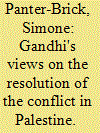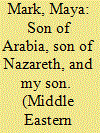| Srl | Item |
| 1 |
ID:
086720


|
|
|
|
|
| Publication |
2009.
|
| Summary/Abstract |
This historical analysis of Mahatma Gandhi's views on the Jewish-Arab conflict in Palestine at the time of the British Mandate distinguishes four phases. The initial involvement is Gandhi's intervention in support of the Caliph's temporal rule in Palestine. The second deals with a secret offer of mediation addressed to the Jewish Agency in Jerusalem. The third is his highly controversial letter to 'The Jews'. In the last phase, Gandhi chose to remain silent, but is alleged to have stated that the Jews had a good case and a prior claim, a statement that seems at variance with previous attitudes. The question is raised as to how far Gandhi's views were consistent. They are explained by the evolving political context in India, as well as in Palestine, the two being intertwined in an ever tightening knot. Gandhi's commitments are revisited and clarified in the light of new research.
|
|
|
|
|
|
|
|
|
|
|
|
|
|
|
|
| 2 |
ID:
186157


|
|
|
|
|
| Summary/Abstract |
This article focuses on the campaign waged by Herut, a right-wing National-Liberal party and its leader, Menachem Begin, to abolish the Military Government imposed on the Arab citizens of Israel between the years 1948-1966. The article draws on multiple sources that have not yet been studied to analyze Herut’s struggle for the annulment of the Military Government, while placing it in a broad historical and political context. It shows that Herut derived certain political benefits by campaigning for the annulment of the Military Government. However, it also establishes that Herut paid a price for its campaign, suffering criticism from within the right-wing political camp and wrestling with allegations from the left-wing political camp. The analysis of Herut’s campaign for the annulment of the Military Government illuminates the liberal ideological foundations of the movement that has held sway in Israel for over four decades, affirming its commitment to liberal values, and the belief of its founding father, Begin, in civic equality between Jews and Arabs in Israel.
|
|
|
|
|
|
|
|
|
|
|
|
|
|
|
|